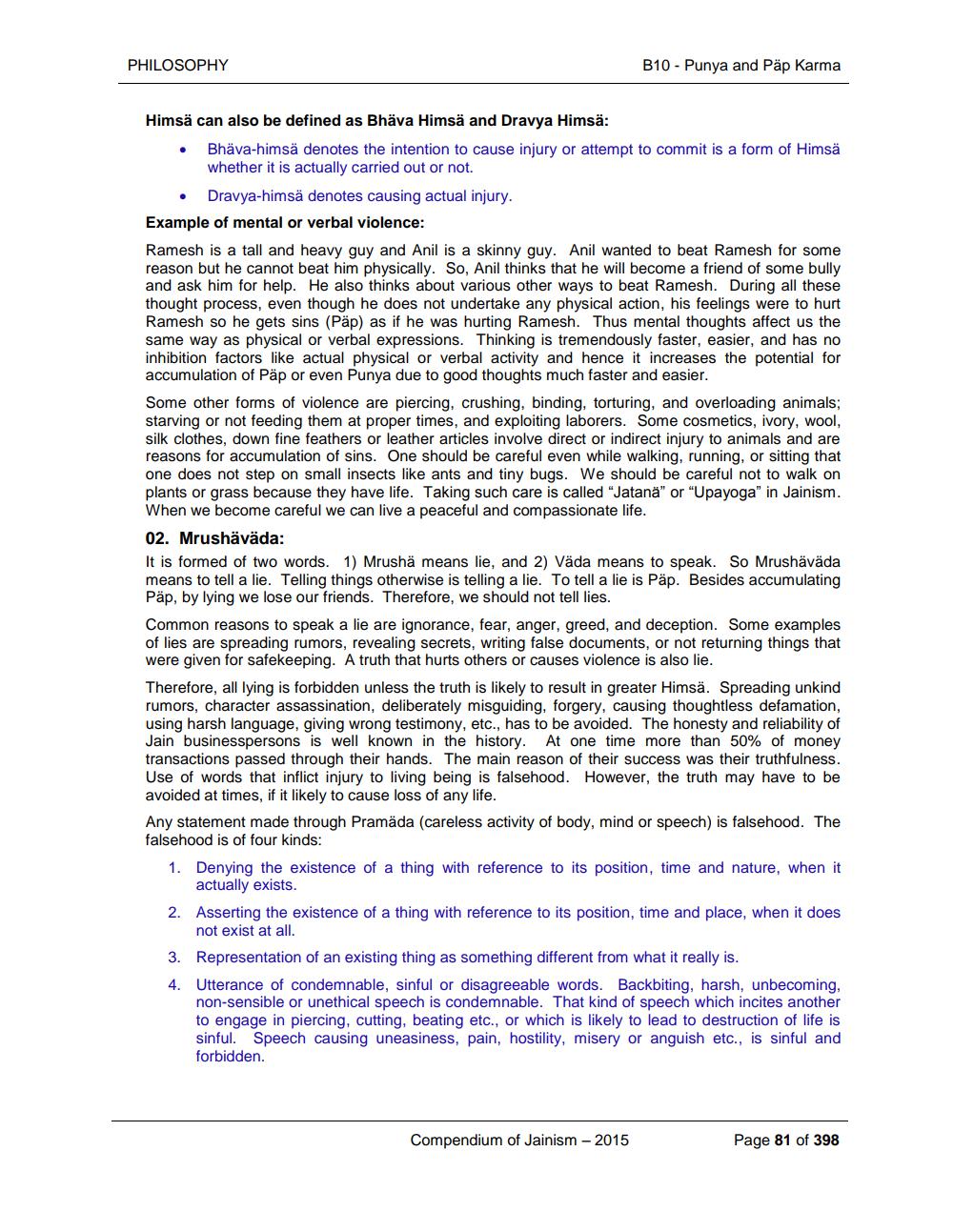________________
PHILOSOPHY
B10 - Punya and Pap Karma
Himsä can also be defined as Bhäva Himsä and Dravya Himsä:
• Bhäva-himsä denotes the intention to cause injury or attempt to commit is a form of Himsä
whether it is actually carried out or not.
Dravya-himsä denotes causing actual injury. Example of mental or verbal violence: Ramesh is a tall and heavy guy and Anil is a skinny guy. Anil wanted to beat Ramesh for some reason but he cannot beat him physically. So, Anil thinks that he will become a friend of some bully and ask him for help. He also thinks about various other ways to beat Ramesh. During all these thought process, even though he does not undertake any physical action, his feelings were to hurt Ramesh so he gets sins (Päp) as if he was hurting Ramesh. Thus mental thoughts affect us the same way as physical or verbal expressions. Thinking is tremendously faster, easier, and has no inhibition factors like actual physical or verbal activity and hence it increases the potential for accumulation of Päp or even Punya due to good thoughts much faster and easier. Some other forms of violence are piercing, crushing, binding, torturing, and overloading animals; starving or not feeding them at proper times, and exploiting laborers. Some cosmetics, ivory, wool, silk clothes, down fine feathers or leather articles involve direct or indirect injury to animals and are reasons for accumulation of sins. One should be careful even while walking, running, or sitting that one does not step on small insects like ants and tiny bugs. We should be careful not to walk on plants or grass because they have life. Taking such care is called "Jatana" or "Upayoga" in Jainism. When we become careful we can live a peaceful and compassionate life. 02. Mrushäväda: It is formed of two words. 1) Mrushä means lie, and 2) Väda means to speak. So Mrushäväda means to tell a lie. Telling things otherwise is telling a lie. To tell a lie is Päp. Besides accumulating Päp, by lying we lose our friends. Therefore, we should not tell lies. Common reasons to speak a lie are ignorance, fear, anger, greed, and deception. Some examples of lies are spreading rumors, revealing secrets, writing false documents, or not returning things that were given for safekeeping. A truth that hurts others or causes violence is also lie. Therefore, all lying is forbidden unless the truth is likely to result in greater Himsä. Spreading unkind rumors, character assassination, deliberately misguiding, forgery, causing thoughtless defamation, using harsh language, giving wrong testimony, etc., has to be avoided. The honesty and reliability of Jain businesspersons is well known in the history. At one time more than 50% of money transactions passed through their hands. The main reason of their success was their truthfulness. Use of words that inflict injury to living being is falsehood. However, the truth may have to be avoided at times, if it likely to cause loss of any life. Any statement made through Pramäda (careless activity of body, mind or speech) is falsehood. The falsehood is of four kinds: 1. Denying the existence of a thing with reference to its position, time and nature, when it
actually exists. 2. Asserting the existence of a thing with reference to its position, time and place, when it does
not exist at all. 3. Representation of an existing thing as something different from what it really is. 4. Utterance of condemnable, sinful or disagreeable words. Backbiting, harsh, unbecoming,
non-sensible or unethical speech is condemnable. That kind of speech which incites another to engage in piercing, cutting, beating etc., or which is likely to lead to destruction of life is sinful. Speech causing uneasiness, pain, hostility, misery or anguish etc., is sinful and forbidden.
Compendium of Jainism - 2015
Page 81 of 398




